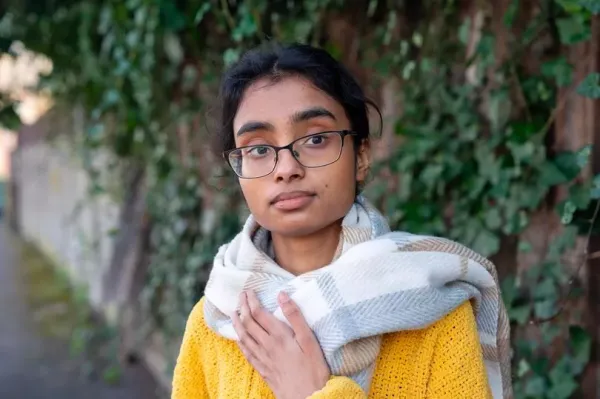
Raven Dixon-Biggs is describing what it’s like to work at a industry convention.
“When you work in promotions there is an expectation you are sexy, you are flirty,” the 31-year-old mum, model, and fashion and beauty entrepreneur from the West Midlands, says.
“Not only do you need to have engaging customer service skills, you need to be able to sell the product with your looks. For the vape shows I remember telling the company I’m not wearing a bikini and 5-inch stilettos to work an eight to 10-hour shift. I’m not going to exploit myself for men to hand out free samples of and be the most attractive stand for the day.
READ MORE:
READ MORE:
“I have been rejected for roles as I’ve refused to wear hot pants, or bikinis. Yet I saw men in t-shirts and trousers. Why isn’t that the same for women?” Raven was just one of the people we spoke to as part of an investigation with.
In the wake of a national moral panic about the – which in February hit an 11-year high – research from the Trust uncovers a toxic reality for millions of young women whose working lives are fraught with unfair, discriminatory and illegal practices.
New research from the charity shows 33% feel trapped and 67% face discrimination. There were 37% who said they had to put up with unsafe working environments and 26% with sexual harassment – because they worried they wouldn’t get the hours they need if they called it out.
When Raven was 19, she became the youngest supervisor at a well-known DIY firm. Then, she says, a new manager joined who flirted with employees and shared pornography at work. When she didn’t go along with it, “he demoted me”. She left to join a temping agency. “I’ve been in a job where I’ve been selling car tyres and getting paid less than male colleagues,”
she adds.
Then she tried work in promotions. “I’ve done silent auctions work – you turn up on the day and you’re given a skin-tight dress. And if you don’t fit in the outfits, it’s basically goodbye.
“At one silent auction, there was a girl too scared to tell her agency she was pregnant as they’d stop giving her work – so she ended up wearing a size 8 dress with a bump.”
Young Women’s Trust – which champions those aged 18 to 30 on low or no pay – welcomes the government’s new . But the charity is urging Labour to make sure its plans to strengthen workers’ rights are accompanied by the resources to properly promote and enforce these rights.
When Liberty Cheeseman, 29, applied for a job as a specialist mentor for mental health and autism at a university, she says she had no idea it was insecure work. She had left a secure role at a charity, but says she was told the university job would help her get onto a PhD course.

“When I was offered the job, I was ecstatic,” says Liberty, from Cardiff. “I was told it was £25 an hour, but we were paid £12 – and if students didn’t book in, we didn’t get paid. There was no work in the holidays. I had to use my own laptop and phone, and we had no training – we were just told how to log onto the portal. I soon realised I’d been catfished. We were sold this amazing role but for six months I just scraped by. I was under unbelievable amounts of stress while at the same time supporting students who were suicidal, suffering mental health problems and PTSD. I was trapped.”
The Young Women’s Trust says they are more exposed to the challenges of insecure work because they’re more likely to enter the industries that use it. They’re also paid less than men in insecure jobs.
For example, in retail, 38% of young women say they earn less than £10 per hour, compared to just 21% of young men. Fine Art graduate Hansnii Aukhjee, 24, was excited to get an interview for a creative studio assistant job advertised as a paid role. But she says she was then told she had to work three days a week for a month – unpaid.

She has since worked as an unpaid intern at a start-up estate agents, and then was offered a job as a social media manager for a charity. The salary was advertised at £180 a month for four hours a week, but when the contract came through it said fixed rate £60 a month,” she says.
“I didn’t take the job. I’m now applying for paid secure jobs and using my savings to afford basic necessities. I have chronic health issues, and I just want a job that pays so I can look after my health and save. I’ve been left very anxious after all I’ve been through.
“I think employers take advantage of young people – most who hired me have just used me and not offered permanent secure work. I get a lot of unpaid offers. Employers need to be transparent.”
Claire Reindorp, Chief Executive at Young Women’s Trust, says rogue employers are not just getting away with these practices, but undercutting businesses doing the right thing.
“At work we should all expect to be safe, paid a fair wage, and treated with respect,” she says. “It’s clear that’s very far from a reality for many young women in insecure work, who face discrimination, sexual harassment, and unpredictable work schedules. They’re left with precarious finances and poor mental health.
“And there’s a very real ‘sticky floor’ in this type of work. It’s not just a stopgap – they can easily get trapped. The evidence is clear young women in this type of work can feel stuck, powerless and exhausted.”
Liberty gave up her career in mental health and now works in customer services for a bank. One day she hopes to go back to helping people with their mental health. “One of the reasons I stayed so long was because I didn’t realise we could speak up, or know our rights,” she says. “As women we are just expected to get on with it, to be good, and not be dramatic. “I’ve joined the union now. We need to get rid of zero-contracts – women become so trapped and it is not easy to leave.”